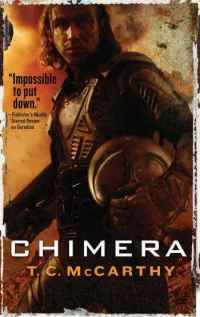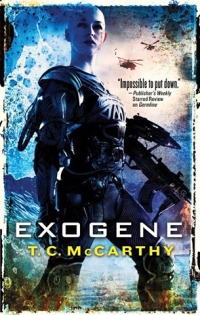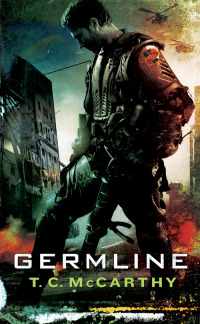Chimera by T.C. McCarthy
 Monday, July 16, 2012 at 3:36PM
Monday, July 16, 2012 at 3:36PM 
Published by Orbit on July 31, 2012
The war is over (or so it appears) but Stanley Resnick is still fighting. His job -- the only element of his life that brings him joy -- is to track down and destroy rogue Germlines, the genetically engineered female warriors who have chosen not to meet their scheduled deaths. The Germlines are designed to spoil like rotting meat after two years, but Germlines are starting to appear who, long after their expiration date, show no signs of spoilage. Of course, you know that if you read Germline, the first novel in the Subterrene War trilogy (if you haven’t read Germline, you should, both to give context to Chimera and because it is an excellent novel).
Resnick is assigned to track down Margaret, a Germline last seen in Exogene. The hope is that Margaret will lead Resnick to Dr. Chen, who is suspected of deactivating the Germlines’ safety protocols, thus granting them continued life. The hitch: Margaret has become a religious icon in Thailand. Together with her protégé Lucy, Margaret lives under the protection of the Thai government, while Catherine (who died in Exogene) has achieved a status akin to sainthood. Resnick undertakes the assignment with the help of Jihoon Kim, a linguist and analyst whose former job involved keeping track of borderline psychopaths like Resnick.
Chimera sharpens the conflict between humans and the Germlines (who consider themselves closer to God than the nonbred) while adding another sort of soldier bred in tanks, this one a creation of the Chinese, an abomination that lives its life within an armored suit, an enemy of humans and Germlines alike. Margaret, in turn, has created a group of followers called the Gra Jaai -- nonbred humans who nonetheless revere Catherine and learn “how to get closer to God through killing.” Nothing could be less human than the Chinese genetics, yet Lucy wonders whether they have a soul, while Resnick can’t imagine that Lucy has one. As was true of the first two novels, questions of religion and the meaning of life and death pervade the story. Chimera adds a new question: whether humanity (whatever we mean by that term) is really worth fighting for.
T.C. McCarthy is a master of characterization. His readers will not be disappointed by his newest creation. Resnick is so acclimated to combat that crazy is normal. Resnick no longer fits safely within civilian society -- not that American society, with its complete lack of privacy, is a place he really wants to be. Everything is a war to Resnick because war is all he knows. He finds it easy to kill Germlines -- he is, in fact, addicted to it -- and his ever-present anger is easily displaced, making him a threat to pretty much everyone. Still, McCarthy never settles for a simplistic characterization. Resnick is thus torn by conflict: he loves and hates war; he feels the need to protect and to abandon the son he didn’t father; his instinct is to kill Margaret yet he questions that desire as he comes to understand her.
McCarthy has given careful thought to the geopolitics of the messed up future he’s created. There’s sort of an Apocalypse Now/Heart of Darkness feel to the story, with Margaret playing the role of Kurtz, right down to the corpses staked to poles in her jungle compound. The jungle has a life and a madness of its own. As always, McCarthy's combat imagery is vivid. Battle scenes are tense; the combatants’ fear is palpable. Throughout the novel, McCarthy’s prose is electrically charged.
Each novel in the trilogy has its own strengths. Germline has the most poignant character. Exogene has the best action. Chimera reveals the big picture and raises serious philosophical questions. I’m not sure which of the three I like best (there’s plenty of characterization, action, and philosophy in each), although I had the strongest emotional response to Germline. I recommend them all, not just to fans of military science fiction but to any reader who appreciates good storytelling.
RECOMMENDED

